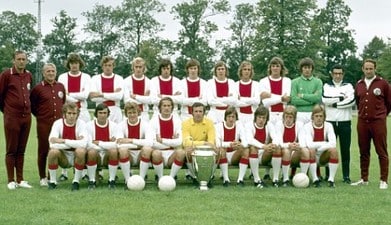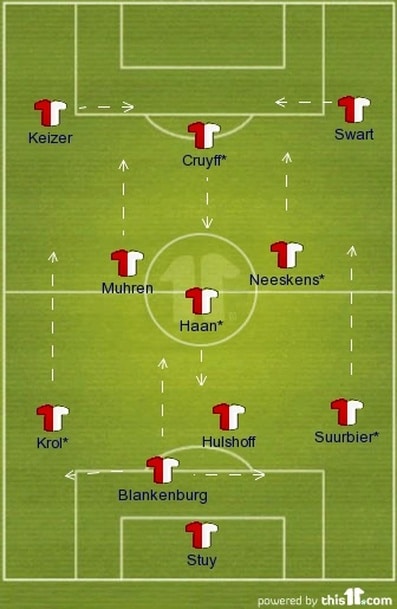Dave Bowler reflects on the great Ajax 1971-73 team that was so dominant in Europe at the time.

It’s become common currency, certainly since their dismantling of Manchester United at Wembley in May, for the current Barcelona outfit to be lauded as the greatest club side of all time.
 Perhaps they are, perhaps others should wear the crown. As we will see in this series over the course of the season, while you pays your money and you takes your choice, there are plenty of other teams who can lay legitimate claim to that title.
Perhaps they are, perhaps others should wear the crown. As we will see in this series over the course of the season, while you pays your money and you takes your choice, there are plenty of other teams who can lay legitimate claim to that title.
The seeds of Barcelona’s success at Wembley in 2011 were sown at the same stadium – or its predecessor at any rate – exactly 40 years before, when Ajax of Amsterdam began their run of three straight European Cup wins, back in those far off days when you had to win your own league in order to qualify for the competition.
Arguments rage over whether the shift to the Champions League has made it harder to carry off the trophy these days, the fact that no side has repeated that hat-trick since the shift to a league format indicating it is, but Ajax’s achievement should not be denigrated, for their dominance of the game in the early 1970s made for a seismic shift in the way we thought about the game.
Dutch football, now so revered around the world, had no such stature back in 1971. As a nation, their European Nations Cup record was non-existent, their World Cup record laughable, one game, one defeat in each of the 1934 and1938 competitions their sole contribution.
Early European Success
But as the 1960s ebbed away, it was clear that something was stirring. A youthful Ajax side made it all the way to the 1969 European Cup Final before being crushed 4-1 by Milan in Madrid but a year later, Feyenoord became the first Dutch club to claim the title, beating Celtic 2-1 in extra time in the San Siro.
But while Feyenoord were first, Ajax were the best. Coached by Rinus Michels, led by his apostle on the pitch Johan Cruyff and gradually assembling the first elements of what would be the national team’s golden side of the 1970s, Ajax busied themselves by giving the world what was to become known as total football. If Feyenoord pipped them to the greatest prize, the need to equal and then surpass their great rivals along with the burning desire to atone for their humbling in 1969 burned bright within Michels and his team.
By the 1970/71 tournament, Ajax were ready. A comprehensive thumping of Celtic in the quarter-finals followed by victory over Atletico Madrid took them to the final and a game with Panthinaikos. The gloriously named Dick van Dijk gave the Dutch side an early lead, but Ajax were not as imperious as they’d have liked. Both substitutions were made at the interval, evidence of Michels’ tactical nous, and though it took them until the 87th minute to score a second through Arie Haan, the victory was comfortable and never really in question.
Swagger
Europe began to sit up and take note of the swagger in Ajax’s step, and particularly of the way in which players refused to stick to regimented positions as Ajax employed the most fluid of systems, full-backs operating as auxiliary forwards, strikers dropping deep to stiffen the midfield, sweepers rampaging beyond them to create and to score. That said, the fact that their opponents had been the little fancied Panthinaikos meant few were quite ready to confer greatness on Ajax yet. That would be another 12 months away.
After all, who could dismiss the claims to greatness of Inter Milan? But for all their experience, for all the brilliance of Facchetti and Mazzola, for all their expertise in spoiling a game, in closing it down, Inter were simply second best. Truly unveiling the full majesty of the vision of Cruyff and Michels – the coach by now replaced by Stefan Kovacs – Ajax dominated from first whistle to last.
Catenaccio, the scourge of European football for a decade, was swept aside by a totally different conception of the game, a game of movement, of style, of tactical and technical eloquence, of pure joy at the possibilities the game held, while introducing a level of fitness that outstripped anything we had seen before.
Cruyff & Co
Ajax were approaching full maturity, the side brimming with Dutch brilliance. As well as Cruyff, there was Neeskens, Gerrie Muhren, Krol, Haan, Suurbier, Keizer, an XI who understood not just their own job, but that of the other ten, and who could acquit those other roles almost as well as their own. It took until the second half before Ajax got the goals that their superiority demanded, but with Cruyff twice on the scoresheet, justice was done and Ajax retained their trophy.
Completing a hat-trick is reserved only for the true Gods, but that was the standing of the men from Amsterdam by this stage. Italy provided the opponents again, Juventus this time on the receiving end. Johnny Rep opened the scoring after four minutes and for the remaining 86, the Italians barely saw the ball as Ajax stroked it around the park with an arrogance bordering on contempt, a trait that would ultimately be the undoing of the national team.
3 In A Row
It ended 1-0 to Ajax, a third straight European Cup, and something approaching immortality. But we are all mere mortals in the end, even Cruyff, and the lure of a new challenge, infinitely better rewarded, was too much to turn down. In 1973, he left Ajax for Barcelona for a sum just short of £1million which seemed simply unbelievable and just a little immoral back then. While Ajax were no one man team, that one man had been the difference between a great team and a legendary one. It was never the same again.
But in Catalonia, homage was paid to Cruyff, to Michels and to the method of total football. Cruyff ultimately became the manager there, setting down principles that have persisted, enthusing and inspiring a young player called Pep Guardiola who, in the fullness of time, would pick up the baton. And so the story rolls on…

